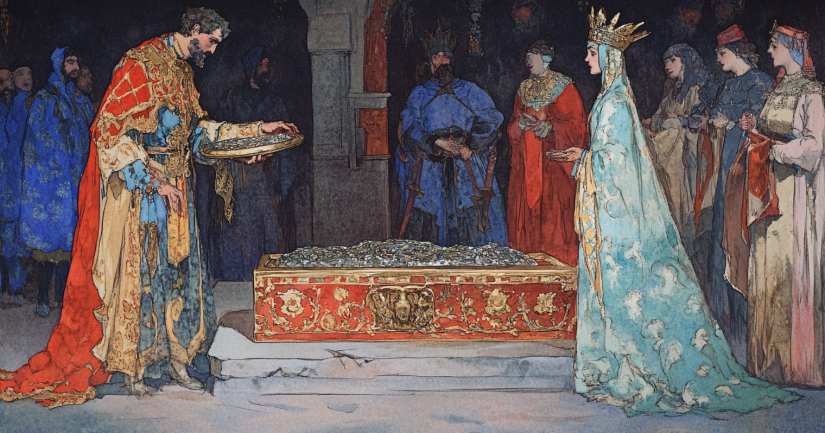
Examine the climactic choices of Act 2 Scene 9 in The Merchant of Venice with our engaging quiz. As you navigate this scene, you will explore a tapestry of themes, from justice and mercy to the complexities of human character. This quiz invites you to delve into the thoughts and actions of Shakespeare’s rich characters. You will meet the proud Prince of Arragon, whose choices reveal more than just his desire for Portia’s hand.
Discover how Shakespeare weaves wit and wisdom into every line. Reflect on the motives behind each decision. This scene challenges you to think deeply about the nature of choice and consequence. Will you grasp the subtle hints and underlying messages? Will you understand the weight of the casket test?
Another suitor takes his chance, but what comes next? Step into Act 3 with Merchant Of Venice Act 3 Scene 1 Quiz to see how tensions rise. Want to retrace earlier choices? Go back to Merchant Of Venice Act 2 Scene 8 Quiz. And if you want to challenge yourself on everything, take the Merchant Of Venice Full Book Quiz!
Through this quiz, you will gain insights into the characters’ ambitions and the broader societal norms at play. Each question will sharpen your understanding and appreciation of Shakespeare’s craft. Join us as we uncover the layers of this pivotal scene. Your journey through Venice starts now, promising both challenge and enlightenment.
Merchant of Venice Quizzes – Will you get your pound of flesh?
What Happened – Merchant Of Venice Act 2 Scene 9
The Prince of Arragon arrives in Belmont. He is there to choose one of the three caskets. He hopes to win Portia’s hand in marriage. The three caskets are made of gold, silver, and lead. Each casket has an inscription. The Prince reads the inscriptions carefully. The gold casket says, Who chooseth me shall gain what many men desire.
The silver casket says, Who chooseth me shall get as much as he deserves. The lead casket says, Who chooseth me must give and hazard all he hath.
The Prince decides to choose the silver casket. He believes he deserves Portia. He thinks he is worthy of her. He opens the silver casket. Inside, he finds a picture of a fool. There is also a scroll with a message. The message tells him that he chose wrong. It says that he is a fool for thinking he deserves Portia. The Prince is disappointed. He leaves Belmont.
Portia is relieved that the Prince did not choose correctly. She tells her servant, Nerissa, that she is glad he failed. A servant enters and announces that a new suitor has arrived. This suitor is from Venice. Portia and Nerissa are curious about this new visitor. They hope he will be different from the previous suitors. The scene ends with Portia and Nerissa waiting to meet him.
Merchant Of Venice Act 2 Scene 9 – Quotes
- “All that glisters is not gold.” – {Prince of Morocco}, ‘Reflecting on his choice of the gold casket, which did not contain Portia’s portrait.’
“Fare you well, your suit is cold.” – {Portia}, ‘Speaking to the departing Prince of Arragon after he chooses the wrong casket.’
“Let none presume to wear an undeserved dignity.” – {Prince of Arragon}, ‘Expressing his belief that nobility should be earned, not inherited.’
“The fire seven times tried this.” – {Prince of Morocco}, ‘Referring to the gold casket, believing its value is proven through trials.’
“With one fool’s head I came to woo, but I go away with two.” – {Prince of Arragon}, ‘Bemoaning his poor choice as he leaves Belmont.’
“O, these deliberate fools!” – {Portia}, ‘Her private critique of the suitors who fail to choose the correct casket.’
“Thus hath the candle singed the moth.” – {Prince of Arragon}, ‘Acknowledging the peril of his own ambition and choice.’
“I wisheth them a fair departure.” – {Portia}, ‘Expressing relief that the suitors are leaving, thus she remains free to choose her own husband.’
